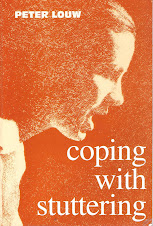I have always had a problem with the term "stutterer", and even the more politically correct "person who stutters" (PWS) has its drawbacks.
The traditional argument against "stutterer" is that it describes a person only in terms of a speech defect, thereby ignoring the whole person. A second argument is that stuttering may not include overt sound or word repetitions; it can also involve silent blocks, and / or secondary behaviors such as blinking or other muscle movements.
And what about the covert stutterer? Some covert stutterers never actually stutter, as they word-substitute so much that their speech is fluent. Then also there is the mild stutterer who may be fluent for 90% of the time. Surely it is incorrect to describe such a person as a "stutterer".
My major concern about the term, however, is its possible detrimental effects on the person who stutters. Words do not only describe; they can also shape and reaffirm. Continuously regarding yourself as a "stutterer" may sabotage your efforts to manage and overcome the disorder. If you always see yourself in these terms, it will reinforce your "stutterer's self-image". There are strong indications that the "stutterer's self-image" is a powerful force, frequently resulting in relapse for people who are working toward improved speech.
Dr. Martin F. Schwartz advises people who stutter NOT to see themselves as stutterers, but rather in more positive terms: as "airflow speakers" or "airflowers", so preparing the subconscious for fluent speech through the Passive Airflow Technique. When travelling on the road to improved speech, you have to take your subconscious with you. Working on your speech without working on the psychology of speech and stuttering will probably result in relapses as the mind, not accustomed to fluent speech, rebels against such newfound fluency, resulting in anxiety, more stress and increased stuttering.
Of course, if you have no intention of improving your speech, and have instead opted to fully accept this disorder and come to terms with it, this does not apply. Stuttering is not a sin or a crime; it should be OK to stutter, and if you're happy with both your stutter and the term "stutterer", then that's OK too.







Thanks for the informative article. There are few well-known Speech Therapy For Stammering In Kolkata who provide speech therapy. Looking forward to more informative articles from you.
ReplyDelete